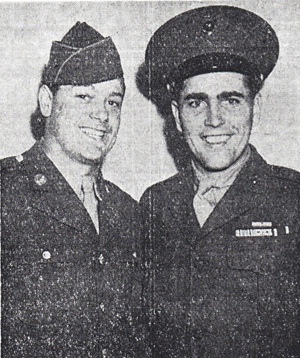
United at home for the first time in almost three years by the illness of their father, Private Frank Everett Fulton and Corporal Harry Ray Fulton recently devoted a great deal of time to discussing the relative merits of the army and the marine corps. Harry spent 15 months in combat areas of the South Pacific; Frank hopes to finish paratrooper training in time to take part in the invasion of Europe.
Marines vs. Army—
Brothers Are Friendly “Enemies”
Two Sioux City Youths Proud of Their Service Branches
When this war is over, the two sons of Mr. and Mrs. Fred Fulton, 3701 Fourth avenue, will have plenty to talk about, and the debate on the relative merits of the army and the marine corps probably will go on for many years.
Recently called home by the serious illness of their father, the boys gave a fair demonstration of what may be expected of them in the future. Corporal Harry Ray Fulton, who enlisted in the marine corps two and a half years ago, already has spent 15 months in the South Pacific and is convinced that the marines are the finest body of fighting men in the world.
Wants to Be There.
Private Frank Everett Fulton, on the other hand, is inclined to believe that the marines overrate themselves and that we’ll find out what fighting really means when the army begins the invasion of Europe. Frank hopes to be there when the invasion begins. He has been in the army three months and is taking paratroop training at Camp Fannin, Tex., and wants to be in one of the first waves of air borne troops to descend on Hitler’s fortress Europe.
If Frank succeeds in this ambition, he probably will equal the exploits of his older brother, who landed with the marines on Guadalcanal August 7, 1942, and spent a total of eight months on active battlefronts.
A member of a communications unit, it was his job to get ashore with the first attacking waves and string telephone lines through the jungle—often harassed by Jap snipers. Harry was on Guadalcanal six months, and underwent 250 bombing attacks.
Weds New Zealand Girl.
Although never wounded, he suffered from concussion because of the steady bombings and was removed to New Zealand. There, after a courtship of five months, he married Miss Joan Braddick in Aukland. He returned to Guadalcanal September 1, 1943, and on November 1, took part in the invasion of Bougainville.
“That was a cinch after what we went through on Canal,” he says. “We learned a lot on the first deal, and we didn’t make the same mistakes twice.”
Assigned to Hawaii when he first went to the Pacific, Harry also took part in American attacks on Midway Island. The campaign bars which he wears carry his combat story. He wears a bar for a presidential unit citation, one for a commendation medal, one for service in the American theater of war and another for service in the Asiatic Pacific. He has seven stars, denoting participation in seven major engagements.
Wants To Go Back.
His present orders call only for a return to the marine base at San Diego, Cal. From there, he may be assigned to a post in this country or sent back to the South Pacific. Either way, he wants to be reunited with his wife as soon as possible.
All this gives the younger brother a mark to shoot at, but he’s full of confidence that, given a chance, the army will show the marines how to win a war. Even when they both come home with chests covered with medals, the argument probably will go on for many years.
Source: The Sioux City Journal, April 23, 1944
![]()
